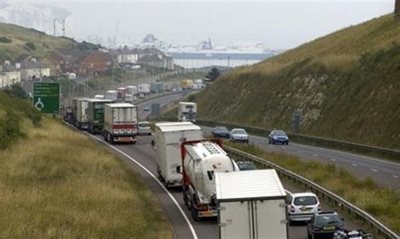Published: 25 June 2018

When Britain leaves the EU on the 29th of March 2019, if no deal has been reached this could bring hauliers from the UK travelling to Europe the day after to a complete standstill according to James Hookham, the deputy chief executive of the FTA (Freight Transport Association).
No deal would mean lorries could be temporarily grounded, speaking with Business Insider he said there are increasing chances of this prediction becoming a reality with “crucifying” tariffs for smaller British firms.
Hookham said the government aren’t taking the threat to the UK’s borders seriously, as it can prove to be a real threat to the country’s economy following Brexit. "The thing that really upsets our members is when these concerns are just dismissed by politicians as trivial or insignificant," he explained.
He felt that the no-deal Brexit would see the country revert to an older set of international agreements in which permits were received, covering international journeys made by 300,000 lorries into Europe per year.
While putting the agreements of old back into place a majority of lorries in the UK would be blocked from entering Europe if the PM cannot negotiate and secure a deal with Brussels. The implications could have a significant impact on smaller firms.
Hookham feels that “Time is running out” and that the longer the government leave negotiations, the less likely it is a deal will be reached. Reports suggest that British negotiators aren’t making sufficient progress for the EU summit next week to sign a transitional agreement. The FTA deputy chief executive found the whole situation “depressing.”
The DFT deputy chief exec said the UK would have to reduce the number of permits to European lorries that come into the country, which would disturb the movement of goods and damage trade relations. This is the work flow that Britain depends upon for food and bulk haulage on an international scale.
He went on to say the industry had become frustrated by the government’s approach during Brexit who have “dismissed the reality of “detailed and complicated” issues such as described facing the industry in the UK.
"The thing that really upsets our members is when a lot of these concerns are just dismissed by politicians as trivial or insignificant," he explained.
"They either don't understand what they're talking about, which I suspect is the case, or they've got no basis for saying it."
As to why UK vehicles will now need to fit these requirements to travel across Europe, it is because the UK licence (while in the EU) is also valid across Europe as a part of Britain’s single market membership. With the licence as it currently stands, UK drivers can move across Europe freely, with unlimited licences available.
This arrangement would end on the day the UK leaves the EU, with no policies in place to make way for the country’s changes. Michel Barnier, who is chief negotiator on the EU’s behalf during Brexit is keen to remind officials that Britain will be a third country once it has left the EU. This means to operate within the EU’s territory third-country licences will be required, monitored by an international body named the OECD.
Without some form of deal on Brexit day, smaller businesses would feel the weight from the heavy costs.
This could mean countries would need to negotiate and agree on the number of trucks authorised for entry into their land. Without a deal, the UK would reverse its methods to the former arrangement with 103 licences.
This means that firms with European customers or supplies, whether importing or exporting, would have to try and find different approaches when delivering goods. Such as shipping, or by air.
Expensive tariffs under WTO regulations following Brexit would be another concern, which Mr Hookham said would “crucify” smaller traders.
"In what is already a very competitive European market, any permanent additional costs that British exports have to bear mean they've got to work even harder to stay competitive. If we crash out without a deal, the tariffs alone would probably crucify most smaller businesses. We need a trade deal which reduces as many of these impediments as possible."
The UK government is moving full-steam ahead with Brexit, as we depart the EU on March 29th 2019, deal or no deal.